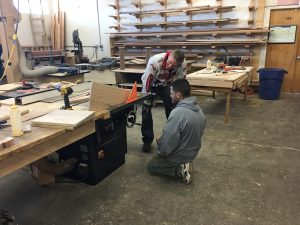There is a place where you can purchase unique custom woodwork, get your vehicle detailed, and have it power washed, all under the same roof. It is all made possible by fathers who are taking part in a community re-entry program, and their work brings in clientele from all over the city.
Fathers Building Futures (FBF) is a local program that gives formerly incarcerated fathers the financial, emotional, and social stability that they need upon finishing their prison sentence. Through this program, they are given employment opportunities and the help to develop skills that will help them succeed in their communities and their personal lives as fathers.
“The program is intended for them to stay as little as they need in order to get stable. Some people just need to get on their feet for a few months. They have to figure out how to live on minimum wage as opposed to what they used to make, then they graduate and we help them find work,” said Emet Ma’ayan, director of FBF.
Many formerly incarcerated individuals are finding their way back into the prison system for technical violations while on parole, rather than on new criminal charges, Ma’ayan said.

Finding employment, which is often required for parole, is one of the largest problems formerly incarcerated individuals face.
“Other folks can just walk in somewhere and get a job. If you have a felony background you are so discriminated against, but it doesn’t count as discrimination, so people are sort of allowed to do that,” Ma’ayan said.
“I got a trafficking charge and a lot of places don’t hire me, because they consider me a high-risk,” said George Sandoval, one of the employees at FBF.
Fathers Building Futures recognizes that a majority of the people who are coming out of prison go back, because they cannot find secure housing or find and maintain verifiable full-time employment. These are two of the many conditions given to parolees to follow as they begin their integration back into the community. Failure to meet even a single condition can lead to revocation and suspension of an individual’s parole, resulting in them returning to prison.
Newly released inmates not only have to worry about being required to find housing and a job, but they are also dealing with an environment that is far different from the one that they have been accustomed to for many years.
“You are so used to being told what to do, when to do it, and when you’re going to get up. We are so used to all that structure. Then you get out of prison and they tell to get a job and be good and I am over here like what do I do,” said Derek Malkhassian, an employee at FBF.
“People struggle on supervision for many reasons because [they] are returning to an environment similar to the conditions they were in before they got to prison,” said Linda Freeman, the executive director for the New Mexico Sentencing Commission.
FBF is unique in that it helps inmates develop skills while in prison and continue this process once they are released.
Even though work like automobile detailing and woodworking might not be the typical jobs that people are looking for, FBF is trying to teach soft skills that people might use to start a business, Freeman said.
Apart from teaching these particular trades to the fathers within the program, it is also accommodating to their schedules allowing them time to see their children and bring them to the job site for the day if they cannot make arrangements for childcare.
The program, unlike most jobs, is flexible about leaving work to pick up your kids and returning to work with your kids if needed, said employee Willy Rankin.
Although there are other social enterprise programs that sell services and products and work with re-entry across the country, FBF is different because they are managed by formerly incarcerated individuals, Ma’ayan said.
FBF works with formerly incarcerated fathers six to nine months prior to their release by giving parenting classes that allow them to take part in coached visits and counseling with their children.
The program only takes in 25 formerly incarcerated fathers per year. Their first six months includes training for 20 hours a week. Afterwards, many are referred to long term employment and a few are selected to stay on for permanent employment.
“Emmet has a lot of connections. This place gives you a chance to represent yourself, and if it doesn’t work out here and he sees you fit in another area he will vouch for you,” said Alfredo Baca, an employee at FBF.
FBF has a large success rate among the fathers who take part in the program. According to a report by the New Mexico Sentencing Commission, PB&J Family Services’ recidivism rate is 24.4 percent half of the state’s 47.3 percent.
Despite the successes in the program, federal and state funding is limited for programs such as this one, leaving many formerly incarcerated individuals with a lack of resources, which helps make a transition back into society less likely to be successful.
The program was initially funded by the Department of Health and Human Services for four years. FBF started with PB&J, a local family service, but as of last year have departed from the organization. Now the program is funded by donations, grants, sales, and contracts. Fifty percent of the revenue comes from auto-detailing and the woodshop, 25 percent comes from contracts and on the job training, and the remaining 25 percent comes from donations and grants.
Based on the success of the program, FBF is looking to expand and begin accepting female employees into their program, working with formerly incarcerated mothers.
“That’s the next step, to figure out Mothers Building Futures,” Ma’ayan said.
Follow Derek, Briana and Sol on Twitter!